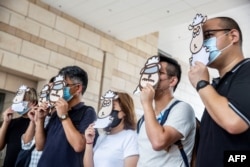A Hong Kong court Wednesday convicted five speech therapists of sedition after they published a series of children books with stories that were deemed anti-government.
Lorie Lai Man-ling, Melody Yeung, Sidney Ng, Samuel Chan and Fong Tsz-ho were members of the General Union of Hong Kong Speech Therapists, which has since closed. All pleaded not guilty in July and had decided not to testify in court.
They were accused of publishing three picture books featuring cartoons of sheep that were trying to repel wolves from their village.
Judge Kwok Wai-kin, one of Hong Kong's designated national security law judges selected by the city's chief executive, ruled all three books were written with seditious intent. In a written statement he implied that children reading the books were being told they are the sheep and the wolves who are trying to harm them are the Chinese authorities.
One of the books told the story of how a group of sheep fought back against wolves trying to occupy their villages.
The publications, which referenced actual events in Hong Kong, including the mass anti-government protests in 2019, were available in local bookstores and online.
Prosecutors see hatred
In a two-month trial, prosecutors said the books had caused hatred toward the government. They argued a sedition offense is like "treason."
Defense lawyers had argued the animal characters were fictional and the allegations were too broad.
The five accused, all younger than 30, were denied bail and have been in custody for a year awaiting the verdict. They now face up to two years in prison when they are sentenced later this week.
The London-based human rights group Amnesty International, which closed its Hong Kong office in October, citing concerns under the national security law, said Wednesday's ruling is an "example of the disintegration of human rights in the city."
Beijing imposed Hong Kong's national security law two years ago to prevent political dissent and bring stability to the city following months of anti-government protests.
Critics say the law has been used to target dissidents, strictly prohibiting acts deemed as supporting secession, subversion, foreign collusion or terrorism. It carries a maximum punishment of life imprisonment. At least 183 people so far have been arrested under the law and several have been jailed.
Although sedition is not among the offenses listed under the security law, recent court judgments have enabled authorities to use their powers under a colonial-era sedition law to target suspects.
'Rolling back to colonial times'
Eric Yan-ho Lai, a law analyst and fellow at Georgetown University in Washington, said Wednesday's verdict has returned Hong Kong's court to colonial times.
"The seditious publication case today marked the era of which the court is rolling back to colonial times as it punishes political dissidents for nonviolent speeches, which is not acceptable under international standards of free expression," he told VOA.
Lai added it was disappointing that the courts had not heeded a recent U.N. Human Rights Committee report that had asked the Hong Kong government to repeal the sedition law.
"The conviction certainly undermines the expert opinion from international human rights scholars and jurists, and further depreciates the Hong Kong government's commitment to the ICCPR [International Covenant on Civil and Political Rights," Lai said.
Kacey Wong, a visual artist and activist from Hong Kong who last year relocated to Taiwan, said the verdict, coupled with the national security law, undermines artistic expression in the city.
"This will accelerate the creative brain drain to places like Singapore, Taiwan and U.K. from Hong Kong. Those creatives who stayed will shift their focus away from political topics and pray for the best, but of course the purge will not end here. It is just the beginning of the Hong Kong culture deconstruction," he told VOA.





